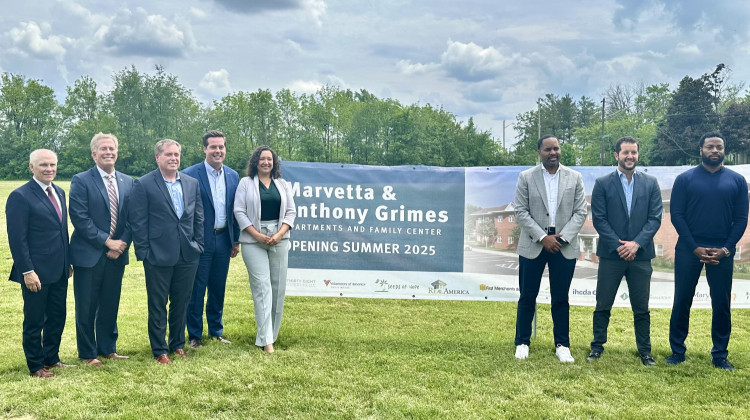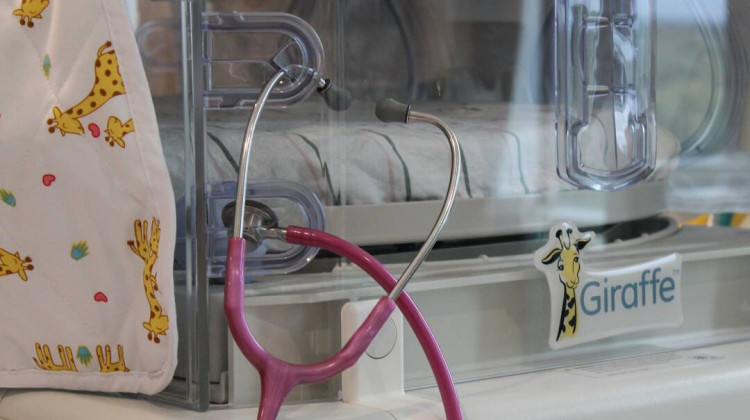
Community leaders and local officials broke ground on the new housing complex that's set to open summer 2025.
Courtesy of Volunteers of AmericaThe southwest side of Indianapolis will welcome a new housing complex next spring that will provide on-site wraparound services to people recovering from substance use, with a focus on families.
Fred Yeakey, an educator at Providence Cristo Rey High School, decided to create the housing development company 2 Thirty-Eight Properties LLC properties in response to the students he serves.
“There will be times that we will have breaks from school and I will come back to school looking to invite our students back — whether it's summer break, Christmas break — and these students would be gone,” Yeakey said. “And when you do home visits, they're gone because the homes that they were living in [are] no longer available, there's locks on there.”
Yeakey believes the community won’t be able to break cycles of poverty without providing families with stable housing. His housing complex idea was selected in 2023 to receive low-income housing tax credits from the Indiana Housing and Community Development Authority.
Now he and other partners, such as Seeds of Hope, Volunteers of America Indiana and Ohio and others, are trying to rethink affordable housing by addressing addiction and other health needs so people can stay sober and remain housed.
The $11-million affordable housing complex, known as the The Marvetta & Anthony Grimes Apartments & Family Center, will be two buildings with a total of 36 two- and three-bedroom units.
The first floor of one of the buildings will provide wraparound services, such as mental health and addiction services, employment, transportation, a preschool operated by St. Mary’s Early Childhood Center with a capacity to serve 60 kids, and a free primary care health clinic. The location will be nearby Seeds of Hope, a transitional housing facility for women who are recovering from drug or alcohol addiction.
Dana Cahill, now sober, struggled with substance use issues off and on for 15 years. She said women struggle to find housing after completing treatment due to strict renting requirements. Many landlords want people to have a job for at least six months and make at least three times their rent. Plus having a criminal background or prior evictions provides additional barriers to housing.
Obtaining child care assistance through the federal Child Care and Development Fund can be a Catch-22, because people need to have a job first to get the vouchers. But Cahill said it’s hard to find a job if someone doesn’t have child care.
“We’ve run our lives to the ground and just ruined everything along the way, so it's really overwhelming,” Cahill said. “I think a reason why a lot of people are afraid to get sober is because of all the work that you have to do. You're literally climbing yourself out of a hole that you've dug yourself so deep into that it's just easier to just say, ‘Oh, I'll do it tomorrow,’ kind of situation.”
But Cahill decided to change her life so she could keep her then one-year-old son and not lose custody of the child she was pregnant with at the time.
Cahill was in treatment for 144 days. But even though she went through treatment, her family was still hesitant to have her live with them. With nowhere to go, she turned to the VOA, a comprehensive human services organization, and received a grant from them that paid for her rent and utilities while she got back on her feet.
“I don't know what I would have done [or] where I would have went if I wouldn't have had that opportunity,” Cahill said.
Getting sober has allowed her to repair the relationships with her family. Now she is excited for people in recovery to have that opportunity, and build community and support with others who have gone through similar situations.
“[This is] kind of the natural progression in our delivery of services and really see this as an opportunity for us to meet a growing need in the community,” said Kevin Moore, chief strategy officer for VOA.
Moore said the complex is expected to be completed in May or June of next year.
Contact WFYI’s health reporter Elizabeth Gabriel at egabriel@wfyi.org
 DONATE
DONATE








 Support WFYI. We can't do it without you.
Support WFYI. We can't do it without you.